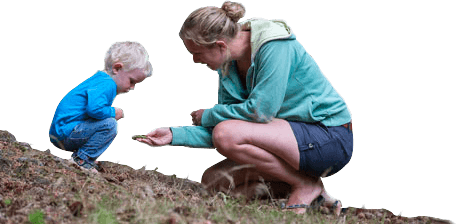The New Forest boasts an impressive array of uncommon and special butterfly species. Being...
How to be Forest friendly
The New Forest is a great place for walking, dog walking, cycling and horse riding. When you’re enjoying healthy exercise, fresh air, beautiful surroundings and the rich wildlife, please help us to care for this very special place.
Ponies, donkeys, cattle, pigs & sheep: For their safety and your own please keep your distance from grazing animals, especially mothers and their young. Although owned and cared for by local people called commoners, they are unpredictable and best treated as wild. Please don’t feed or pet them; there is plenty of natural food and it’s best that they don’t come to rely on people’s attention. They may look friendly but they can bite and kick, especially ponies with foals.
Dogs: To minimise disturbance to wildlife, livestock and other people, please keep your dogs under close control – if necessary use a lead. Pick up after your dog, especially around car parks, on paths and where people play or picnic, and take bagged waste home if there is no litter bin.
Birds: To help ground-nesting birds rear their young safely, keep yourself, dogs and horses on the main tracks from the beginning of March to the end of July.
Litter: Your food and litter could harm the ponies and donkeys. Please take your litter home if bins are full.
Barbeques & fires: To reduce the risk of wildfires damaging the Forest, no campfires, BBQs or stoves are allowed.
Parking: To avoid damage and obstruction, please park only in designated car parks, not on a verge or in gateways. Lock your car, taking any valuables with you and leave Forestry England car parks by dusk.
Driving: The New Forest can become congested, especially at busy times. It’s for this reason we encourage visitors to use public transport where possible. The ponies and other animals have no road sense and frequently stand or walk on the unfenced roads, so give them (and walkers, cyclists and horse-riders) a wide berth and be especially careful when driving at night.
Cycling: Cycling is allowed only on the waymarked tracks and other designated routes. When approaching people and animals, call out a warning and pass slowly and wide. Try to leave gaps for overtaking vehicles and never ride more than two abreast. Keep to a safe speed, wear bright colours to be visible and always use lights in the dark.
Camping: Please note that camping in the wild and overnight parking is not allowed. There are 10 campsites in the New Forest run by Camping in the Forest, and a number of private sites.
Forest management: Stay safe by taking note of warning signs and keeping away from work sites and vehicles.
Fungi: Please leave fungi for other people to enjoy. Fungi are essential to the New Forest’s internationally protected ecosystem. Foray leaders must apply for permission for educational excursions from Forestry England in advance. If you suspect or see commercial picking please call Forestry England on 0300 067 4600 or the National Trust on 01425 650035.
Unidentified objects: Areas of the New Forest were used to test bombs in World War I and II. Please keep away from objects that might be dangerous and notify the police immediately on 999.
Horse riding: Horse riders have open access to the New Forest, but to reduce damage to the ground please use tracks when it’s wet.
Ticks: Check your dog and yourself for ticks when you get back home – they can lead to Lyme Disease.
Newsletter
6
Free
Six free walking routes when you sign up for New Forest Newsletter


